
Give and Take: Part 2
10 minutes. Strong language
"Get everyone ready to travel," I said as John opened the door to me.
"What?"
"Somebody's out there," I said.
"Who?" demanded the midwife. "Who would be out there on a night like this?"
"Well, nobody who's up to any good," I replied. "Decent people are all inside where it's warm."
"This woman has just given birth," she said to the husband. "And endured this man's butchery. She's in no condition to be moved."
"Unless you know how to give that speech in French or Mi'kmaq, I'd get everyone ready to go."
She blanched. "You think there are Indians out there."
"Seems best to prepare for that," I said. "This is good weather for a raid. No pickets out, hard to organize pursuit. A small band can move fast, hit a settlement and be back to Winnipesaukee before word reaches Boston."
"They're savages," she shuddered. "They'll torture us all to death."
They weren't, relatively speaking, and they probably wouldn't, but I didn't want to argue any more. If this was a raiding party, they would kill most of us. Certainly John and me. Probably Molly and the baby if they were too fragile to travel. They might take Goody Poore captive, but unless she could hold her tongue back to Canada, they'd likely hit her with a tomahawk. Hard to blame them if they did.
But that wasn't cruelty. At least not more than you'd find in any other raiding party. It made not sense to take prisoners who could fight you, or ones who'd slow you down. The Indians had no prisons for captives. They'd take those who they could adopt into the tribe and just eliminate the rest.
So no worse than hearing in other times that the Vikings or Saxons or Normans were at the door.
"You have a cart," I said. "Get blankets in the bed, put your family in it and get moving. Get to Londonderry. Make sure they alert the militia. If they're ready, and they get people into the blockhouse, they may be fine."
"How many Indians you think are out there?"
"I don't know," I said, picking up my musket. "But I mean to find out."
I loaded my musket, then stuffed a rag into the muzzle to keep the snow out. I didn't prime it, because I didn't trust that to stay dry. I wrapped a cloth around the lock, then checked my knife and tomahawk. The only thing I wanted less than getting into a fight was getting into a fight I wasn't prepared for.
I nodded to the farmer, touched my hat and walked out into the snowy night.
I started off to the north, away from the farm. After a while, I caught the smell of smoke again. The wind was from the Northwest. That was the direction any raid would come, over the mountains and down the Merrimack. Winter was a poor time to travel. A bad time to go so far to hunt. They should have been snug in their wigwams on the St Lawrence.
But winter was a good time for a raid. No patrols out, any sentries huddled in doorways out of the wind and wrapped up for warmth, not listening for danger. Messages for help, and reinforcements traveled slowly. A lightly armed group of men used to moving fast in the wilderness could strike hard and be gone before anyone could react.
I struck the old road down to the river. Calling it a road was a stretch, but it led to the river and served as a way to get wagons of goods back and forth. Most traffic went up and down the river. The road to Boston was tortuous in good weather and impassable in bad. I moved slowly along the edge of the rutted snow of the track as the pale, cold grey of dawn started to bleed into the Eastern sky.
With day breaking the raiding party would be moving soon. I hoped John had gotten his family moving and that they had enough head start. They'd be moving a lot slower than an Indian warband.
I hoped to meet the enemy on the road, and that I'd hear them first. Neither one of those hopes was a sure thing. They'd probably take this route, as it was the fastest and speed was important to them. And I was a single man, expecting danger. They' be a large group hoping not to encounter anyone. Chances were I'd be quieter.
The wind carried a snatch of conversation to me. Sounded like French, but too faint and not enough of it for me to get the meaning.
I looked around and found an evergreen growing close to the road, the low branches, heavy with snow, hanging to the ground. I left the trail, detoured into the woods to hide my tracks and approached it from the forest side. Once I reached my hide, I squeezed into the open space between the trunk and the branches and settled down to wait.
Why was I doing this? I could easily slip away from this war party, come back to my cabin when it was over. I didn't have any real loyalty to the English, or any animosity to the Indians. I'd wintered with the Huron some years back, and gotten along just fine. The English and the French, and probably the Spanish farther South played the tribes against one another and their competing European settlers, encouraging raids and paying for scalps. Not their fault they were caught in the middle.
But it wasn't John and Molly Campbell's fault either. Or their newborn son. I couldn't slide off into the darkness and leave them to their fate. The Indians wouldn't be worse than the Campbells of Argyle's Regiment at Glencoe or Cromwell's pious troops let loose on the population of Drogheda, but it would be bad enough, and the young family didn't deserve that.
I primed my musket, closed the frizzen and waited.
The hardest thing for a soldier to learn is patience. Movement is noise, noise brings trouble. But squatting on your haunches in the snow is a sore test. The bowed branches were packed with snow and kept the worst of the wind out, so it wasn't too bad.
I found a gap in the branches to use as a peep hole. Soon I saw he lead elements of the war party. Algonquin, probably, all carrying muskets. I counted two dozen, plus a handful of French irregulars. Near the back of the force was an officer in uniform, dove grey coat with blue facings, sword at his hip. I wonder what he did to get assigned out here.
Or to whose mistress he did it.
Fighting thirty heavily armed irregulars was above my pay grade. If I stayed put, they'd walk right past, then I could slip out unseen and run to town.
But could I get there ahead of them? And could the young family?
I didn't want to live with that on my conscience.
I did want to live, though.
Could I do something to stall them? Other than entertaining them with my lingering death?
Maybe. If I timed it just right.
The uniformed officer was almost at the end of the line. A single Algonquin walked trail behind him, but far behind, watching the backtrail.
I pulled the plug from the muzzle of my musket, eased my tomahawk out of my belt and waited quietly as they passed. The point man was scanning left and right, but I was well hidden, and it's hard to stay alert when you're cold and don't expect any danger. The others were even less observant. If there was danger, the point man should have spotted it.
I waited until the French officer passed my hide and slipped quietly out from my shelter. I stepped quickly behind him and buried my tomahawk in the back of his head.
The man stiffened and toppled forward. My hatchet stuck fast so I let it go and turned to face the Indian walking the end of the line.
He had a musket, but instead of raising it, he hefted a carved war club. Maybe he wasn't carrying his musket primed and loaded in this weather. Maybe he just liked the feel of a war club against a skull.
He ran towards me. I cocked my musket and snapped it to my shoulder, desperately hoping that the powder was still dry. I lined up on him, but he was almost on top of me. At the last moment, he darted to his right, trying to get out of line of my shot. He was an old hand at rushing men with guns.
But so was I.
I stepped back and to my right to give myself an extra yard and followed his dodge with my weapon, pulling the trigger as he changed direction toward me again.
To my relief, the musket fired. The ball hit him right in the breastbone a handspan below his throat and he spun around and flopped down in the snow.
I didn't turn and look to see if any of the others were moving toward me. Maybe they hadn't heard me strike the Frenchman, but I had no doubt the heard the gunshot. I grabbed up the fallen Indian's war club and ran full tilt into the forest.
When you've just killed two men within sight of twenty eight of their comrades, don't wonder if they'll chase you. Don't look back to see if they're after you. Don't run straight if they have guns, be sure to duck and weave through the trees. And don't slow down.
I ran for all I was worth, the cold air burning my lungs, leaping over fallen logs, bursting through snowy branches, barreling down slopes, always tacking more to my left. South. Toward Londonderry and shelter and safety. I let the fear I'd been holding down slip its leash and drive my legs, the specter of knives and tomahawks and war clubs smothering the pain and fatigue.
Eventually, when my sight started to go grey at the edges and my legs felt like water, I risked a look back.
Nothing.
I slowed my mad dash and tried to listen. Other than the rasping of my breath and the hammering of my heart, I heard nothing.
I continued making my way to the village, now at a stumbling walk. My legs were shaking and my chest heaved, pulling frigid air into my raw lungs. My musket was heavy in my left hand and the war club in my right, but not heavy enough that I though of dropping either.
I'd snatched up the dead man's club for several reasons. First, if they caught me, I wanted something to fight with. My tomahawk was stuck in a Frenchman and my gun was empty. The other reason was that I wanted some proof that I'd seen the enemy. John Campbell would probably support me, but Mrs Poore might not and if the local militia captain was some portly political appointee, he might think the raid just a bid for attention by a penniless vagabond with a known taste for strong drink.
I'd built a distinguished career as a penniless vagabond, and I freely admit to a liking for the view of the world through the bottom of a glass, but I don't like being spoken down to by portly political appointees.
It wasn't long before I staggered into Londonderry. It bore little resemblance to the city for which it was named. Juts a collection of timber houses and farms near the river, but it had a strong blockhouse and I saw armed militiamen walking the street. I breathed a sigh of relief and stumbled to the blockhouse.
I told the sergeant on duty that I had news for the commander. I was led to a table where a young officer sat.
The sight of the man was reassuring. He was young, tall and broad shouldered and had the weathered face of life spent outdoors. It was a face I'd seen often enough on both sides of the battle line back over the ocean. Strong jawed Scots-Irish, more accustomed to smiling at cruel irony than at frivolity. He wore a practical hunting jacket, not a long uniform coat, and he had a tomahawk at his belt instead of a sword.
Exactly the kind of officer we wanted on a day like this.
"I'm Lieutenant Stark, Mr Roberts," he said. "I'm told you've seen this warband."
"Yes sir. Two dozen Indians and a half dozen French rangers. Led by a French officer." I handed over the club. "Took this off one of them."
"You attacked a band of thirty warriors?"
"Not for all the tea in China, sir. I just let ‘em pass by and ambushed the rear of the column."
The shadow of a grin played across his lips at that. "But why strike at all?"
"Wasn't sure John Campbell and his family had enough of a start," I replied. "Figured I'd delay them a bit. I got the officer and one Indian."
"Then you got away," he said.
"Seemed like enough work for one day."
"Well done." He was studying the war club. "Abenaki," he said. "Out of St Francis."
"Probably," I agreed.
"No doubt in my mind," he said. "I've been there. Spent a winter with the Abenaki. They took me captive and made me run the gauntlet. But then they did adopt me into the tribe."
"It was him or me, Lieutenant."
Don't worry, Roberts. We do what we have to do." he clapped me on the shoulder. "You probably saved the village. With the militia called up and the livestock and noncombatants sheltered, we can hold off thirty warriors. If they'd hit us unawares, half the town would be in flames by the time we could react. Get some breakfast. We'll find some work for you if they do attack."
I found a seat at a table and thought about the men I'd killed. The French officer, who had traveled far across the ocean from his homeland to serve his king, only to die, not wreathed in glory on a battlefield, which he might have been prepared for, but ambushed in a remote wilderness while on a scalp hunting raid. And the Indian, caught up in the middle of a war between two European empires, either of whom would call him a savage and destroy his way of life once they'd won and didn't need any more savages to do their murdering for them.
I'd marched beside a lot of men just like them. Shared campfires and bad food and drink and exaggerated stories. And now they were dead not because I was more righteous, just quicker and sneakier. More savage.
But I had saved two lives last night. Two people who would certainly have died without my aid. Did that balance the scales? Was I fated to both giveth and taketh away? If I did as much harm as good, what was the point of continuing this vagabond existence?
A young woman placed a plate of food and a mug of tea before me, breaking my thoughts.
"Here you are good sir," she said. She hovered a moment. I looked up at her."I couldn't help overhearing how you saved us all. It sounds terrifying. Alone in the forest with all those Indians and Frenchmen."
I looked at the young woman, from her loose golden curls to her blue eyes, wide and shining with excitement, her lips parted and her breathing quick, to the firm, young curves that her modest God fearing dress couldn't quite hide. She gave a little shiver of guilty pleasure at the idea of danger close but not too close. "Would it be too forward of me to ask you about it?"
I took a sip of tea, then turned to face her, putting on my roguish smile.
"So, there I was..."
Books by Patrick LeClerc
Immortal Vagabond Healer Series
Book 1
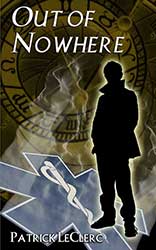
Sean Danet is immortal—a fact he has cloaked for centuries, behind enemy lines and now a paramedic’s uniform. Having forgotten most of his distant past, he has finally found peace. But there are some things you cannot escape, however much distance you put behind you.
Buy NowBook 2
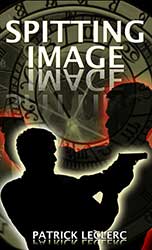
Immortal Sean Danet can heal others with a touch. Finally, after too long as a rootless vagabond, he has found a place he feels he belongs, with friends he can trust and the love of an intelligent, beautiful woman. The life he dreamed of but never expected to attain.
Buy NowShort Historical Adventures
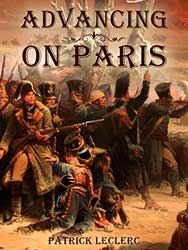
One of the problems with being immortal is you get to live through all of history's most famous blunders. Like Napoleon's inspired idea for a land war in Asia. If you love historical military fiction, action and adventure, or just one of the sexiest urban fantasy heroes of all, Advancing on Paris is a must.
Buy NowMore Great Fiction from Patrick LeClerc
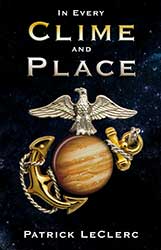
Semper Fidelis. The motto of the United States Marine Corps. On the ragged edges of civilization, Corporal Michael Collins has lived those words, taking on riots and evacuations, rebels and terrorists. Asteroid belt patrol is just another deployment. Ninety nine percent boredom, one percent terror.
Buy Now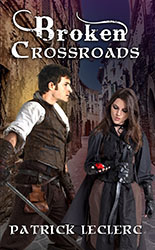
The city of Laimrig, once a mighty hub of commerce and a seat of power sinks into corruption and decay. Slavers, crime lords and corrupt officials hold sway while the ruling nobility wallow in decadence. War rages beyond the borders, while within rebellion simmers and sinister plots unfold.
Buy Now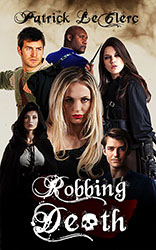
Trilisean is an acrobat turned burglar. Conn is a jaded former mercenary. Against the background of deadly blades, subtle schemes, glittering treasures, and dark sorceries, fate has thrown them together.
And fate has a sense of humor.
Buy Now